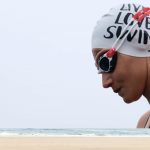Becoming an open water coach
Two weeks ago I took a trip to Walsall and the offices of the STA (Swimming Teachers’ Association) to do two of their courses. The first was their Level 1 Award for Pool to Open Water Coaching and the second, their Level 2 Award for Open Water Swimming Coaching. I also qualified as an STA Open Water Swimming Tutor.
This wasn’t, in case you were wondering, because I have any plans to become an open water swimming coach but as part of an on-going process, as a swimmer and a writer and commentator about open water swimming, to increase my understanding of the sport.
Currently, there are three options to gain an open water swimming coaching qualification in the UK. You can become a triathlon coach through the British Triathlon Federation, you can take the ASA Coaching Open Water Swimming course or you can follow the route I took with the STA.
There are a few differences between the qualifications. Obviously, if you go the BTF route you would be expected to learn about coaching cycling and running, and it would be a big plus if you were interested in triathlon. A long time ago I did a BTF Level 1 coaching course but you need to progress to levels 2 and 3 before you can coach in open water.
According to Jason Tait of South West Swim, who holds both the ASA and the STA qualifications, the ASA Coaching Open Water Swimming qualification is geared primarily towards those working with competitive swimmers. It is in fact a bolt-on qualification for existing Level 2 Swimming Coaches.
In contrast, the STA qualification doesn’t have a pre-requisite, although you have to complete both parts in order to coach outside. The original material was written by triathlon coach Rick Kiddle. As a result, much of the course relates to triathlon style swimming, but it also recognises that open water swimmers have broader interests than racing in wetsuits.
Personally I believe that the best coaching is delivered by passionate coaches that have a much deeper understanding of what they are teaching than can be learned on any course. Experience, curiosity and empathy rather than certificates are what makes a good coach.
That’s not to say there’s no value in the qualifications. On the contrary, going through the qualification process signals your intent to take the coach’s role seriously and provides a strong foundation for developing your coaching skills. In addition, both the STA course I did last week and the BTF Level 1 course I took previously rightfully place a strong emphasis on safety. I assume the ASA does the same. This is essential, not only to protect swimmers but also to protect coaches. Holding a qualification and maintaining membership of the awarding body provides coaches with insurance cover in case something goes wrong.
Dave Candler, the STA’s new CEO, says providing open water qualifications is “about professionalising the industry and improving teaching standards.” One of his big concerns is that although there are plenty of experienced open water swimmers out there offering advice, if there was an accident or incident they could find themselves liable and legally unprotected.
As well as taking the coaching course I also qualified as a tutor, so H2Open can now deliver the STA Open Water Coaching course (i.e. we can train people to become STA qualified coaches). The course lasts two days with day 1 covering the pool to open water component while day 2 takes prospective coaches outside. We don’t have any course dates planned as yet but if you are interested in becoming an STA open water coach, please let me know.







